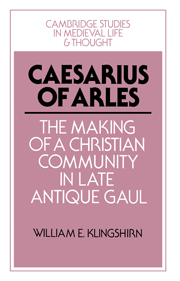Book contents
- Frontmatter
- Contents
- List of maps
- Acknowledgments
- List of abbreviations
- Concordance of Caesarius's Letters
- Map 1 The diocese of Aries and environs (c. 500)
- Map 2 The city and suburbs of Aries (c. 530)
- Introduction
- 1 In search of the vita perfecta
- 2 Late Roman Aries
- 3 The making of a reformer
- 4 Visigothic Arles and its bishop
- 5 The Ostrogothic peace
- 6 Christian rhetoric and ritual action
- 7 Christianity as a community religion
- 8 The limits of christianization
- 9 The coming of the Franks
- 10 The legacy of Caesarius
- Select bibliography
- Index
- Cambridge Studies in Medieval Life and Thought Fourth series
9 - The coming of the Franks
Published online by Cambridge University Press: 02 December 2009
- Frontmatter
- Contents
- List of maps
- Acknowledgments
- List of abbreviations
- Concordance of Caesarius's Letters
- Map 1 The diocese of Aries and environs (c. 500)
- Map 2 The city and suburbs of Aries (c. 530)
- Introduction
- 1 In search of the vita perfecta
- 2 Late Roman Aries
- 3 The making of a reformer
- 4 Visigothic Arles and its bishop
- 5 The Ostrogothic peace
- 6 Christian rhetoric and ritual action
- 7 Christianity as a community religion
- 8 The limits of christianization
- 9 The coming of the Franks
- 10 The legacy of Caesarius
- Select bibliography
- Index
- Cambridge Studies in Medieval Life and Thought Fourth series
Summary
Caesarius emerged from the Council of Vaison at the height of his political power, the uneven success of his programs of christianization and depaganization notwithstanding. His suffragans had supported his reform program at the Councils of Arles, Carpentras, and Vaison, joined him in censuring Agroecius at the Council of Carpentras, and together with Liberius and other lay aristocrats, endorsed his definition of grace at the Council of Orange. Theoderic had made these councils possible in the first place by incorporating the rest of Caesarius's metropolitan province into the Ostrogothic kingdom, thus allowing Caesarius to confirm in practice the metropolitan authority he claimed in theory. Popes Symmachus and Hormisdas, moreover, had extended valuable privileges to his monastery for women, and Pope Felix had supported his actions against Agroecius. By the late 520s, however, the political environment that Caesarius had found so favorable to his own ambitions was already beginning to deteriorate. Within six years of the Council of Vaison, largely as a result of events outside of his control, he was to lose much of the support he had come to depend upon from the Ostrogothic administration, his suffragan bishops, and the bishops of Rome.
RAVENNA AND ROME: 526–35
When Theoderic died in 526, he was succeeded by his ten-year-old grandson Athalaric, whose mother Amalasuintha was appointed to serve as regent. Without the powers of a king or the capacity to lead the Gothic army, Amalasuintha found it difficult to maintain Theoderic's delicate balance between aspirations to Romanitas and fidelity to Gothic tradition.
- Type
- Chapter
- Information
- Caesarius of ArlesThe Making of a Christian Community in Late Antique Gaul, pp. 244 - 272Publisher: Cambridge University PressPrint publication year: 1993



